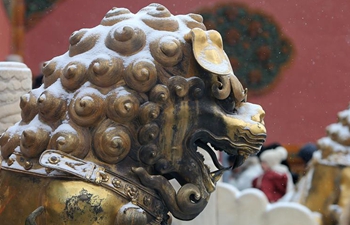CANBERRA, Feb. 20 (Xinhua) -- Biodiversity in Australia's iconic Kakadu National Park has been "decimated" by invasive cane toads, a leading expert has warned.
Cane toads were introduced to Australia to eradicate sugar cane beetles in Queensland in the 1930s. They have since spread across northern Australia, devouring crops and depleting native fauna populations.
They first appeared in Kakadu, a 19,804 square kilometer protected area of the Northern Territory (NT), in the early 2000s.
Graeme Sawyer, a toad expert who served as Lord Mayor of Darwin, the NT's capital city, between 2008 and 2012, said he has witnessed the impact of the toads on Kakadu's native species.
"In eight or so trips into that country including lots of walking around at night, we never saw an olive python or a water python, we saw about two slatey grey snakes, and nothing else in the reptile species," he told the Australian Broadcasting Corporation (ABC).
"No goannas, none of the people who live there had seen a goanna for like seven years, when they used to eat them on a regular basis."
"The collapse of those systems, and when you look at the numbers of toads and where they are, and you map that up with some of the biodiversity stuff, it's awful."
Earlier in February, Sawyer told a parliamentary inquiry into controlling cane toads that the "devastation on the wildlife out (in Kakadu) is something you have to see to believe", accusing the government of having "its head in the sand" in dealing with the issue.
"The impact of toads 15 to 20 years in is unbelievable," he told the inquiry.
Australia's cane toad population has grown from the 102 introduced in 1935 to hundreds of millions and the pests are moving west across the continent at a pace of between 50 and 60 kilometers every year.
Widely considered the most devastating pests introduced to Australia, the toads have no natural predators on account of their poison killing any animal that eats one.
"In the late dry season there are thousands of cane toads," Sawyer told the ABC.
Anthony Simms, Kakadu's biodiversity manager, said there "is no way of effectively managing toads."
"It is a complete and utter waste of time," he said.













